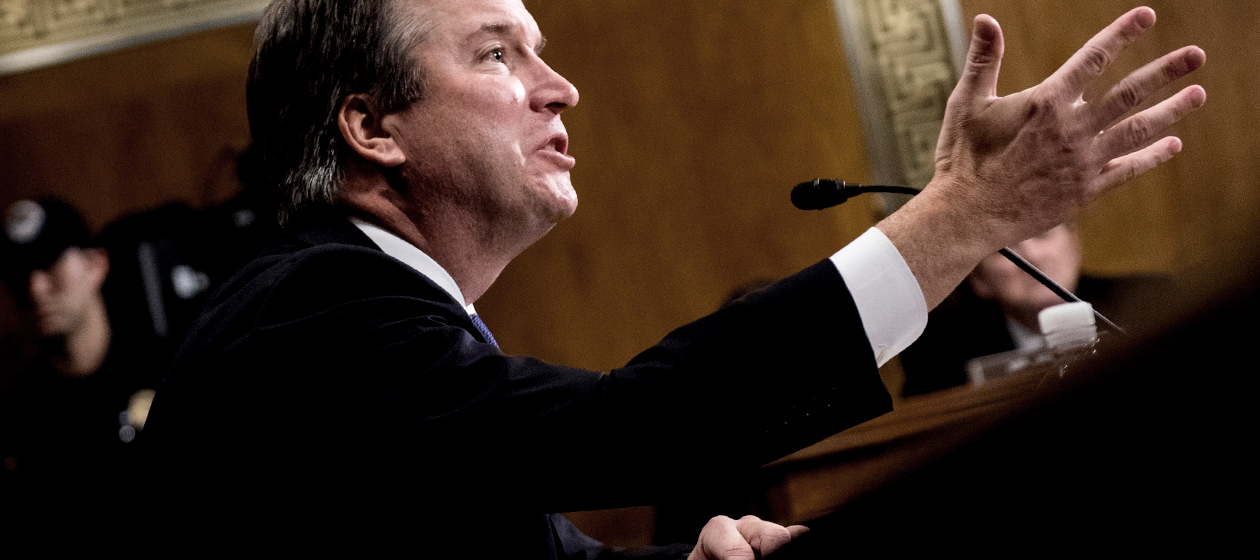The Kavanaugh hearing was a train wreck
Even by the standards of most high-profile congressional hearings, it was ill-conceived, poorly executed, and painful to watch


A free daily email with the biggest news stories of the day – and the best features from TheWeek.com
You are now subscribed
Your newsletter sign-up was successful
Thursday's hearing on the accusations of sexual assault brought against Supreme Court nominee Brett Kavanaugh was a train wreck. Even by the standards of most high-profile congressional hearings, it was ill-conceived, poorly executed, and painful to watch.
My impressions from the hearing were at the same time broadly political and narrowly human. Despite the attempt to give the proceedings the character of a trial, complete with cross-examination from an elected prosecutor, there was nothing rigorous about it.
I should say at the outset that after nearly nine hours of testimony, questions, and grandstanding I have no definite opinions about the veracity of the allegations made by Christine Blasey Ford. Nothing in Ford's testimony gave the impression that she was being anything but truthful. Some have interpreted Kavanaugh's behavior during the hearings — the alternating belligerence and anguish — as evidence of his guilt. I am not so sure. It is just as possible to hear in his voice the frustration of a man who has been wrongly accused. If this actually were a trial and I were a juror I would certainly not vote to convict Kavanaugh. Thank goodness I am not a senator.
The Week
Escape your echo chamber. Get the facts behind the news, plus analysis from multiple perspectives.

Sign up for The Week's Free Newsletters
From our morning news briefing to a weekly Good News Newsletter, get the best of The Week delivered directly to your inbox.
From our morning news briefing to a weekly Good News Newsletter, get the best of The Week delivered directly to your inbox.
Ford was courageous. So, too, was Kavanaugh. This cannot be said of any other person who spoke on Thursday. Both sides were disingenuous. Dianne Feinstein and her Democratic colleagues waited more than a month to do anything with the allegations. They used none of their virtually unlimited opportunities to address the accusations with Kavanaugh, to assemble witnesses, to confer with their Republican colleagues about what they had learned, to give President Trump a chance to withdraw his nominee. They exploited a woman's pain for maximum partisan advantage. Their endless harangues about a potential FBI investigation in which Kavanaugh agreed to participate on multiple occasions insulted the intelligence of hundreds of thousands of viewers. Nothing about Ford's conduct suggests that this is what she wished to happen. Meanwhile Republican Chairman Chuck Grassley flatly refused to allow Mark Judge, Kavanaugh's alleged accomplice, to testify either in public or in a private session of his committee. Kavanaugh's own obstinate refusal to acknowledge the value of securing proper testimony — as opposed to a narrow six-sentence statement drafted by a lawyer — from Judge is the only serious mark against his conduct on Thursday.
Despite their repeated claims about the value of the day's proceedings, no member of the Senate gave the impression that he or she cared in the slightest about what was being said by either Ford or Kavanaugh except insofar as it could be exploited. Not a single mind was made up or changed in that room, even if many flitted back and forth in front of televisions and laptop screens across the country.
I have written before about the implications of these accusations for both opposition to legalized abortion in this country and the #MeToo movement. The hearing did not fundamentally change my view that confronting the reality of sexual assault will require the evaluation of accusations that seem incredible, that emerge seemingly out of nowhere, that involve witnesses whose motivations seem suspect at best, and that doing so will sometimes involve casting aside many valued procedural shibboleths.
For good or ill I have come to believe that discussing Kavanaugh's nomination in this broader context was a mistake. This is not only because of the epistemic difficulties inherent in this case, but because for so many people the stakes here are so high that any attempt at reasonable conversation became impossible. The moth-eaten veil of civility has been lifted, probably for good, not only in the Senate itself but among those portions of the American public who concern themselves with the politics of the Supreme Court. It is impossible to disagree, politely or otherwise, about the fitness of a nominee for the Supreme Court or even the prudence of his or her candidacy. The high court's authority, omnipotent within its narrow sphere, is of too much importance. Is this a good thing? It doesn't matter. It's simply true.
A free daily email with the biggest news stories of the day – and the best features from TheWeek.com
Two weeks ago conservatives were arguing that if they did not push back against these accusations, the future of the nomination process for the judiciary would be one in which the reputations of good men and women could be destroyed on the flimsiest of pretexts. The transition from vaingloriously striving to forestall this peril to embracing it as just another partisan weapon among others was almost instantaneous. On Thursday Lindsey Graham promised as much, suggesting that "what comes around goes around." I hope this was an idle threat. I hate to imagine what else it might mean.
Matthew Walther is a national correspondent at The Week. His work has also appeared in First Things, The Spectator of London, The Catholic Herald, National Review, and other publications. He is currently writing a biography of the Rev. Montague Summers. He is also a Robert Novak Journalism Fellow.
-
 History-making moments of Super Bowl halftime shows past
History-making moments of Super Bowl halftime shows pastin depth From Prince to Gloria Estefan, the shows have been filled with memorable events
-
 The Washington Post is reshaping its newsroom by laying off hundreds
The Washington Post is reshaping its newsroom by laying off hundredsIn the Spotlight More than 300 journalists were reportedly let go
-
 Quiet divorces are sneaking up on older couples
Quiet divorces are sneaking up on older couplesThe explainer Checking out; not blowing up
-
 The billionaires’ wealth tax: a catastrophe for California?
The billionaires’ wealth tax: a catastrophe for California?Talking Point Peter Thiel and Larry Page preparing to change state residency
-
 Bari Weiss’ ‘60 Minutes’ scandal is about more than one report
Bari Weiss’ ‘60 Minutes’ scandal is about more than one reportIN THE SPOTLIGHT By blocking an approved segment on a controversial prison holding US deportees in El Salvador, the editor-in-chief of CBS News has become the main story
-
 Has Zohran Mamdani shown the Democrats how to win again?
Has Zohran Mamdani shown the Democrats how to win again?Today’s Big Question New York City mayoral election touted as victory for left-wing populists but moderate centrist wins elsewhere present more complex path for Democratic Party
-
 Millions turn out for anti-Trump ‘No Kings’ rallies
Millions turn out for anti-Trump ‘No Kings’ ralliesSpeed Read An estimated 7 million people participated, 2 million more than at the first ‘No Kings’ protest in June
-
 Ghislaine Maxwell: angling for a Trump pardon
Ghislaine Maxwell: angling for a Trump pardonTalking Point Convicted sex trafficker's testimony could shed new light on president's links to Jeffrey Epstein
-
 The last words and final moments of 40 presidents
The last words and final moments of 40 presidentsThe Explainer Some are eloquent quotes worthy of the holders of the highest office in the nation, and others... aren't
-
 The JFK files: the truth at last?
The JFK files: the truth at last?In The Spotlight More than 64,000 previously classified documents relating the 1963 assassination of John F. Kennedy have been released by the Trump administration
-
 'Seriously, not literally': how should the world take Donald Trump?
'Seriously, not literally': how should the world take Donald Trump?Today's big question White House rhetoric and reality look likely to become increasingly blurred
